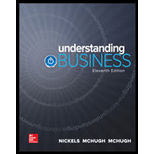
Concept explainers
To think critically about: The alternate measures which one can take instead of copying a material from others, and what consequences will come out of each measure.
Introduction:
Plagiarism is the practice of copying someone else’s ideas and information from a location and presenting it as an original data.
Explanation of Solution
Given information:
Situation is given that friend forgot about a term paper due on next day and asked if individual could copy a paper which friend wrote for another instructor last semester.
Explanation:
The possible consequences that can arise in case my friend copy the term paper from me is that, they have the right to suspend him or even expel him from the university as plagiarism is a punishable offense.
Moreover, this ethical violation will remain on a student’s academic records, which will stress out for rest of the time period in the university. It is also difficult for a student to get an admission if he has been accused of plagiarism.
The alternate measures which can be adopted by friend are:
- Support and motivation in completing the term paper, and should advice to be cautious on such important tasks.
- Instead of copying the term paper, candidate should file a reappear in it; because plagiarism can destroy a person academic career straight away.
Thus, work should not be copied as plagiarism is a punishable offense.
Want to see more full solutions like this?
Chapter 4 Solutions
Understanding Business
- | do not copy from another same ques answer,i need differe nt one. Task Description: One of the most important questions faced by business leaders in the strategic marketing process is a choice of timing to launch new product/technologies and enter new markets. There are two options: to be a pioneer or to be a follower. Both have advantages and risks, the relative success of each strategy depends on several factors, both internal and external. Tasks: Answer the following essay questions: 1. What are the advantages of being a pioneer and follower company? Provide examples of successful pioneer and follower companies. 2. What product life cycle strategies do successful pioneer and follower companies implement to increase growth and maintain a strong competitive advantage? Provide examples of companies to support statements made. Follow instruction: 1. Word: within 2500 word, not bellow 2400. 2. Give table, charts, diagrams, graphs and images should be properly cited and properly named.arrow_forwardHow can I fill the bullet points below to my strength? Strength: Received a scholarship to attend my University. Situation: Task: Action: Result:arrow_forwardHow can I fill the bullet points below to my strength? Strength: Made the Dean's List for three consecutive years. Situation: Task: Action: Result:arrow_forward
- How can I fill the bullet points below to my strength? Strength: Received University Grant: Situation: Task: Action: Result:arrow_forward"My List": How can I fill the bullet points below to my accomplishment? Accomplishment: First Generation College Student Situation: Task: Action: Result:arrow_forwardCommunication Tips (2015) Tactful bragging Respond to the question "So, what do you do?" How can you tactfully brag in your answer to this question as a senior in University majoring in Business Management? Use the three elements (listed below) when crafting your brag statement: Focus on results vs title Process vs job description Loop back to listener Example of an instructor's brag statement: "I help hundreds of students each semester to connect with one another, develop communication skills and prepare for upcoming interviews. Through improv games we explore presence, flexibility, and storytelling. How have your networking experiences on campus been so far?"arrow_forward
- Can you analyse The key strengths and weaknesses of Toyota , the main opportunities and threats it faces and the extent to which it has a sustainable competitive advantage. It will really help me for my understanding! Thanks in advancearrow_forwardCould you explain and analyse the strategy for expanding across the world of Toyota in relation with the text Thanks in advance Pestle Framework 1. Political Factors Because of its global presence, Toyota is susceptible to a variety of international trade policies, like as tariffs and trade restrictions, which can have a considerable impact on the company's operations and profits. The United States automobile market might be disrupted, for example, by the imposition of tariffs on imports from countries such as Canada and Mexico. This would result in higher pricing for automobiles and a decrease in sales. 2. Economic Factors The purchasing power of consumers and the demand for automobiles are both influenced by economic factors such as the expansion of the global economy, exchange rates, and inflation. There is a correlation between economic downturns and decreasing automobile sales, which can influence Toyota's revenue. 3. Sociological Factors There have been substantial…arrow_forwardCan you analyse the strategy that Toyota is using to expand across the world. Thanks in advancearrow_forward
- Can you analyse the key strengths and weaknesses of Toyota's company , the main opportunities and threats it faces and the extent to which it has a sustainable competitive advantage. It will really help me with my understanding (SWOT analysis, VRIO framework). Thanks in advancearrow_forwardCan you analyse the key strengths and weaknesses of Toyota's company , the main opportunities and threats it faces and the extent to which it has a sustainable competitive advantage. (SWOT analysis, VRIO framework). Thanks in advancearrow_forwardCan you analyse the challenges of Toyota's company faces (global strategy, supply chain management, HRM, financial compliance, and organisational structure.) while giving example. It will really help my understandingarrow_forward
 Foundations of Business (MindTap Course List)MarketingISBN:9781337386920Author:William M. Pride, Robert J. Hughes, Jack R. KapoorPublisher:Cengage Learning
Foundations of Business (MindTap Course List)MarketingISBN:9781337386920Author:William M. Pride, Robert J. Hughes, Jack R. KapoorPublisher:Cengage Learning Foundations of Business - Standalone book (MindTa...MarketingISBN:9781285193946Author:William M. Pride, Robert J. Hughes, Jack R. KapoorPublisher:Cengage Learning
Foundations of Business - Standalone book (MindTa...MarketingISBN:9781285193946Author:William M. Pride, Robert J. Hughes, Jack R. KapoorPublisher:Cengage Learning


